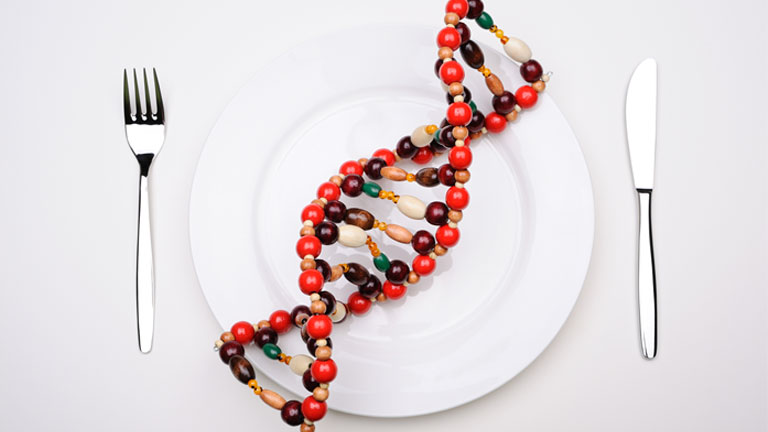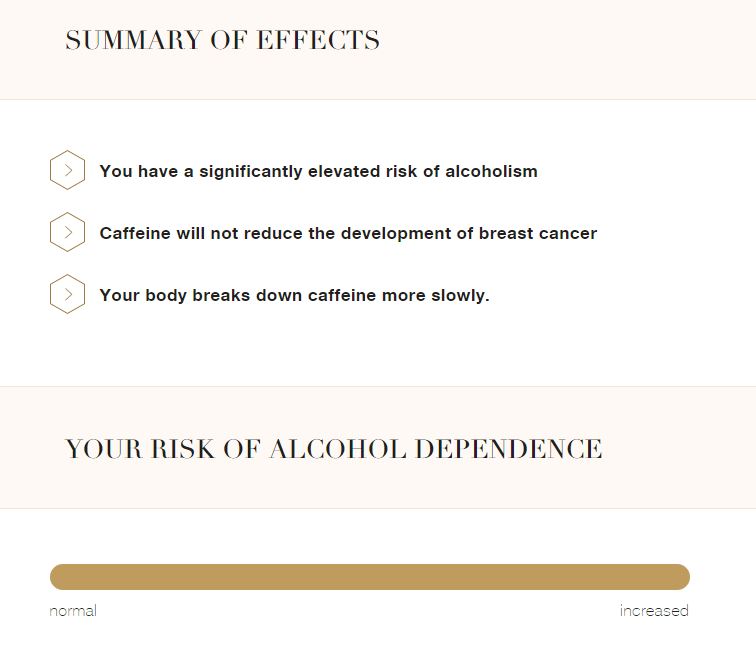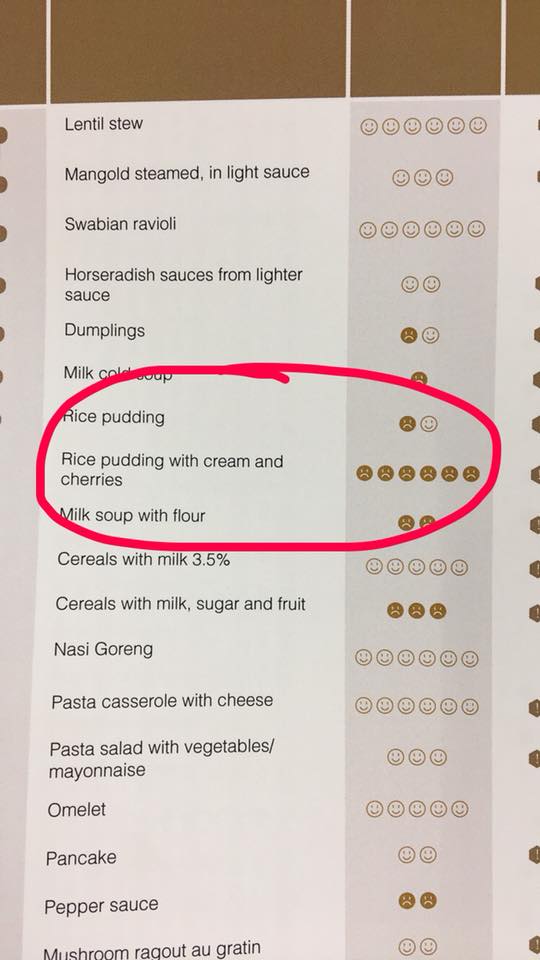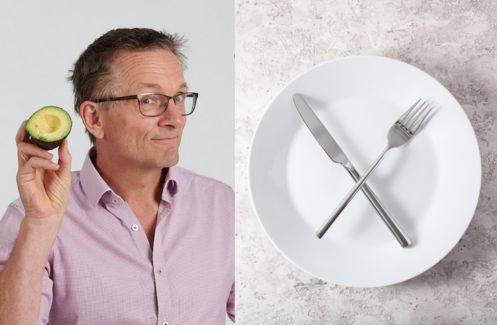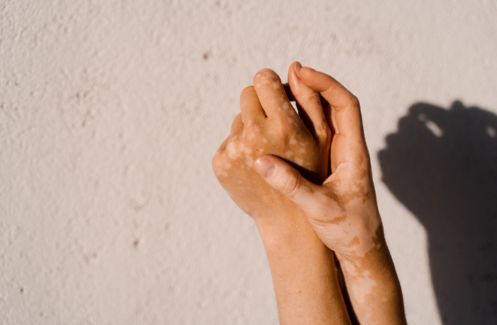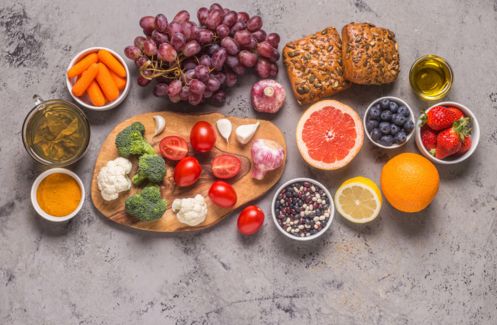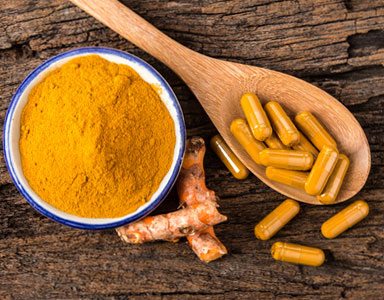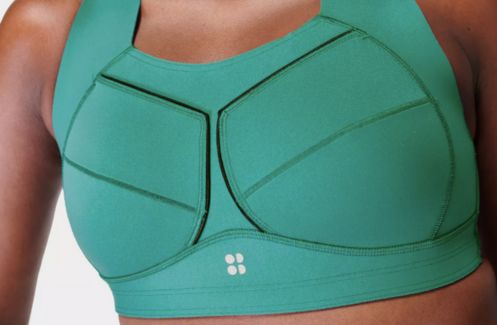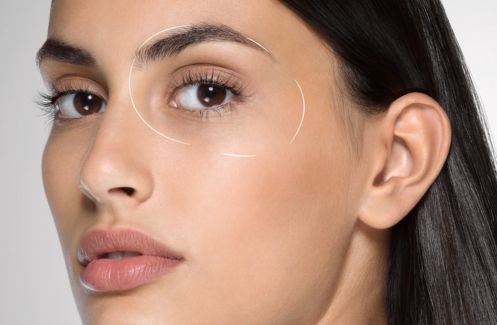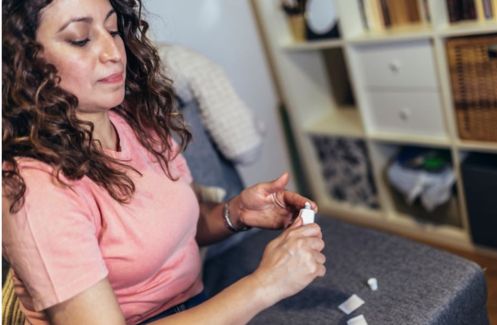DNA genetic tests promise to be the key to optimum weight loss and fitness. Vanessa Chalmers reviewed three and got results and lifestyle advice that totally contradicted each other. She explores the scientific evidence behind the latest trend
I have a predisposition for heart disease. But if I eat broccoli every day and dark chocolate on a Saturday, I might have a chance of dodging the hereditary disease. That’s the advice of health tech startup, iamYiam, who has received a swab of my saliva in the post and analysed my genetic makeup.
Genetic testing is the newest trend for unlocking the secret to living our healthiest lives possible, by looking at the clues in our DNA. Decoding our bodies’ abilities to metabolise caffeine, run a marathon or avoid overeating as written in our genes, is offering ‘hope for serial dieters’ – according to the newest DNA test on the market last week, myDNA. Available at LloydsPharmacy, it costs just £59 to find out whether Atkins is really worth your time – or should you be opting for Paleo?
Surely, if it were written in my genes the results would all be quite similar? Right?
These tests generally work by sorting through your genetic variants (called snips/SNPs) and picking ones out that, in the current state of science, most strongly signify answers about your health, for example how well suited you are to strength training as opposed to cardio.
Companies selling these DNA fitness and diet tests then use scientific papers to interpret what your genes say is the ideal diet and fitness for you and then give lifestyle advice.
It’s a seductive sales pitch. However, the human genome was sequenced to 99.9 per cent accuracy just 15 years ago by The Human Genome Project, and despite humans having approximately 20,000 genes and 10 million SNPs, these tests may look at as little as eight SNPs or genetic variants to determine the best way for you to lose weight.
Could one of these genetic tests really provide reliable and life-changing answers about my health, diet and fitness based on a tiny fraction of my genetics?
As a growing trend, I set out to find more by doing three different mail-order tests – iamYiam, £387, FitnessGenes, £149, and Pure Genetic Lifestyle (Sport Analysis), £650.
Surely, if it were written in my genes the results would all be quite similar? Right?
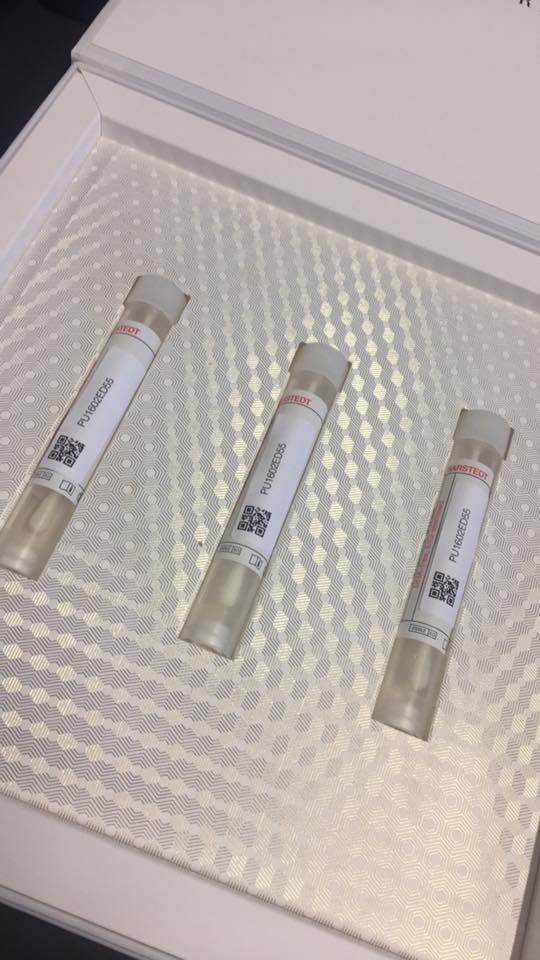
Unlocking answers with a DNA diet test
I excitedly trawled through reports (and even a huge book) sent back to me. I was eager to find out, once and for all, whether my stomach problems through adolescence were down to an intolerance. Or whether my sweet tooth really is, ‘in my genes’?
‘I have a decreased sweet taste perception, which means I’m more likely to overeat treats!’ I exclaimed over my computer screen to my colleagues, relieved there was an answer to my chocolate addiction.
iamYiam says I could have been an Olympic sprinter, a trait present in only 0.1 per cent of the population. But FitnessGenes says this concoction of genes is present in 46 per cent of the population, and Pure Genetic Lifestyle, 50 per cent
Some results were more disheartening to read, such as that which claimed I am at a greater risk of vitamin D deficiency. Some felt like you needed a degree in biology to understand (see photo below). Others were empowering, and after all, a plan of action is what so many of these tests initiate.
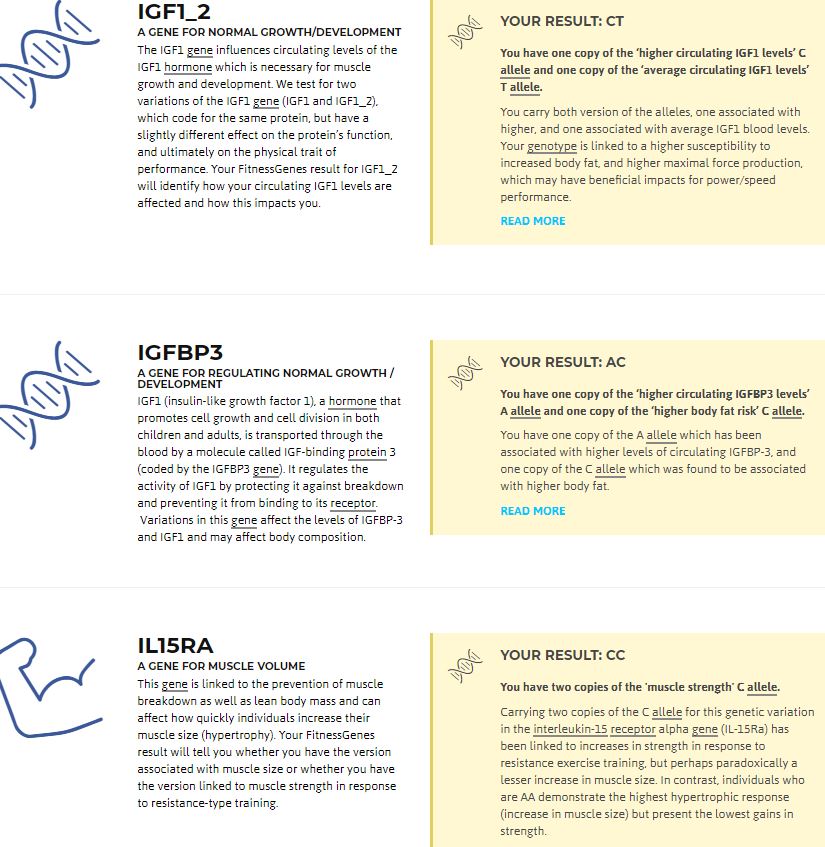
If finding out I genetically have an excellent aerobic capacity, recover well and have genes useful for both power AND endurance sports doesn’t give me a kick up the rear, I don’t know what will.
Owing to the fact that I have a high percentage of both fast and slow twich muscle fibres, iamYiam tells me I could have been an Olympic sprinter, a trait present in only 0.1 per cent of the population.
But hang on – FitnessGenes says this concoction of genes is present in 46 per cent of the population, and Pure Genetic Lifestyle, 50 per cent. My new Olympian career dreams are crushed before they’ve even begun.
Does genetic testing for diet and exercise really work?
But it soon dawned on me that the results were, in places, completely different, and I was left feeling even more confused than before.
iamYiam said my genes indicate I have difficulty digesting lactose. But FitnessGenes said there is ‘no need for you to remove dairy from your diet because you are NOT genetically intolerant to lactose’
Was I lactose intolerant? iamYiam said my genes indicate I have difficulty digesting lactose, I am highly likely to experience discomfort after eating dairy and I may need to avoid it. But FitnessGenes said there is ‘no need for you to remove dairy from your diet because you are NOT genetically intolerant to lactose’. Pure Genetic Lifestyle took my word for it when I ticked the ‘lactose intolerance’ box on my preliminary questionnaire – well, I initially was convinced I was after the results from iamYiam came back.
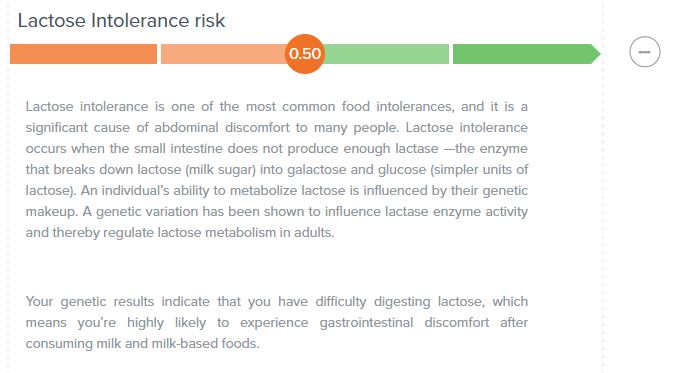
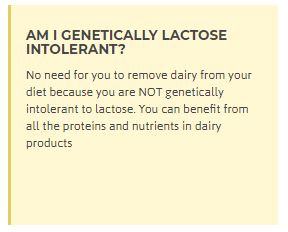
Other broader topics just left me bewildered. I am none the wiser about my risk of obesity, with conclusions about what my genetics means being drawn left right and centre.
According to iamYiam, I have a delayed satiety response, meaning I am more likely to overeat. However, another test FitnessGenes tells me my genotype gives me a lesser appetite and more control over my eating behaviour. Am I now any clearer on whether I am likely to end up obese? No.
According to iamYiam, I have a delayed satiety response, meaning I am more likely to overeat. But FitnessGenes tells me my genotype gives me a lesser appetite and more control over my eating
All tests came back with very different results for my ‘response to saturated fat’.
Pure Genetic Lifestyle says I have a normal response, iamYiam says I have a poor response, meaning I am more likely to gain weight or suffer from high cholesterol, and FitnessGenes says, ‘the risk of obesity when you would consume a diet high in saturated fat (more than 22 grams per day) seems to be relatively low.’ Looks like I’m going to ponder over eating bacon sarnies forever.
I’m confident that, even if I had taken just one of these tests like a normal consumer would, I would be puzzled. This is because the tests interpretations sometime flat out contradicted themselves, let alone eachother. Under my ‘metabolism’ genetics, I am told by iamYiam that my ability to lose fat in response to exercise is very efficient and therefore my risk of regaining weight is low. That’s great – until they then tell me, under ‘propensity for weight regain’, that I am at a genetic disadvantage ‘more likely than the average population’. Well am I, or aren’t I?
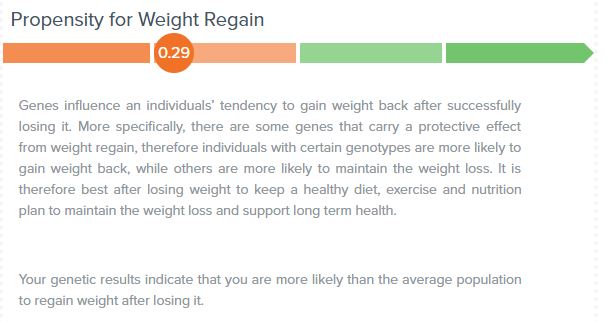
Why are the genetic results different?
When I got in touch with the companies to ask why my genetic results were so different, I got varying answers which generally went along the lines of ‘we are working with the best academics in the world’ (FitnessGenes), ‘we have the broadest test of variants on the planet’ (iamYiam), and ‘we are probably the most accurate’ (Pure Genetic Lifestyle).
‘There are two reasons why’, says independent geneticist Dr. Lawrence Brody, Director of Genomics and Society Division at the National Human Genome Research Institute (NHGRI) who is not affiliated with any genetic testing company. ‘The first could be that they didn’t test for the same thing [variants], second, they did test for the same variant but they used different scientific models for their support, and as science is incomplete, they came to different conclusions, rather than saying, ‘we don’t know’.’
Lorena Puica, the co-founder of iamYiam, explained: ‘To put it simply, let’s say vitamin D has 20 different variants that have been scientifically linked to one’s ability to metabolise vitamin D. If one of the parties looks at five variants and all those five are in the risk phase, they will say you are at risk. But we look at twenty, and if 15 others are ok, those five that are in the risk phase are not the most powerful predictive element.’
In the case of lactose intolerance (which I shall from here on in, call lactose-gate), FitnessGenes claims there is a ‘clear relationship between genes and nutritional deficiencies and tolerances’ on their website – like the colour of our hair or eyes.
Complicated traits like body weight and food consumption are so multi-faceted
Dr Brody agrees that there are ‘reasonably good genetic underpinnings’ for lactose intolerance, and very strong genetics for diseases such as Huntington’s Disease or Cystic Fibrosis – in the case of Huntingdon’s and CF, if you inherit those gene mutations from your parents for those diseases, you will develop those diseases. ‘But complicated traits like body weight and food consumption are so multi-faceted that there is very little that is encoded by a single gene and there are some genes we don’t even know about yet,’ Dr Brody asserts.

Nature vs Nurture
The plot thickens when I bring up one of my more horrifying finds from Pure Genetic Lifestyle – that I am at a ‘significantly elevated risk’ of alcoholism with a full bar (see picture below).
Surely if I was born into an Amish family this would have absolutely zero relevance? ‘Whatever the flavour of the gene they tested, it might be found slightly more frequently in alcoholics compared to non-alcoholics’, says Dr Brody. ‘It’s true genetics can give people nudges in certain directions, but they don’t necessarily push you over the edge.’
iamYiam’s co-founder Puica can’t deny this, and admits, ‘I think genetic data alone has minimum relevance for a person’s health. Genetics are a small component, less than 10 per cent of the entire picture.’ It’s for this reason that these tests are rarely strongly deterministic, instead able to only tell you if you have a tendency or predisposition, says Dr Brody.
Laughable lifestyle advice
It makes you wonder, then, how valuable the lifestyle advice given by these tests is, which covers a huge spectrum in health and fitness.
FitnessGenes tells me to take around 90-120 seconds rest between sets when exercising, iamYiam recommends I get daily Chinese Acupuncture – although I’m not quite sure why, and Pure Genetic Lifestyle recommends I get 59 per cent of my calories from carbohydrates.
Although there was a resounding thumbs up for my body’s response to carbohydrates from all tests there were, again, large disagreements.
If I wasn’t already cautious of my salt intake, I’m now tempted to steer clear completely after one test iamYiam says ‘you have a high sensitivity to sodium (salt) and you are more at risk of heart disease’ and FitnessGenes says ‘you are not highly sensitive to salt intake’.
iamYiam says ‘you have a high sensitivity to sodium (salt)’ and FitnessGenes says ‘you are not highly sensitive to salt intake’
You get the picture. After a couple of weeks of reading, I’m laughing. Especially at a 50-page long food list from Pure Genetic Lifestyle telling me what foods I should and shouldn’t eat for sport performance enhancement and long-term health. It may be accurate but it is so complicated, it’s not practical.
I’m not talking just apples and pears, but every meal you can imagine based on a generic recipe. Luckily, I’m okay to eat fish and chips, nasi goreng, pizza al formaggio and falafel. But stewed beef in red wine sauce – one of my favourite meals – is a no-go with six sad faces aside it. My body can handle rice pudding, but once you add cream and cherries, it’s no longer beneficial for my long term health. WHAT?! Apparently, this list is affected by ‘a background check of 22 hereditary diseases’. Only, this information is kept from me. Therefore I shall forever be Googling ‘what diseases is balsamic vinegar linked to?’
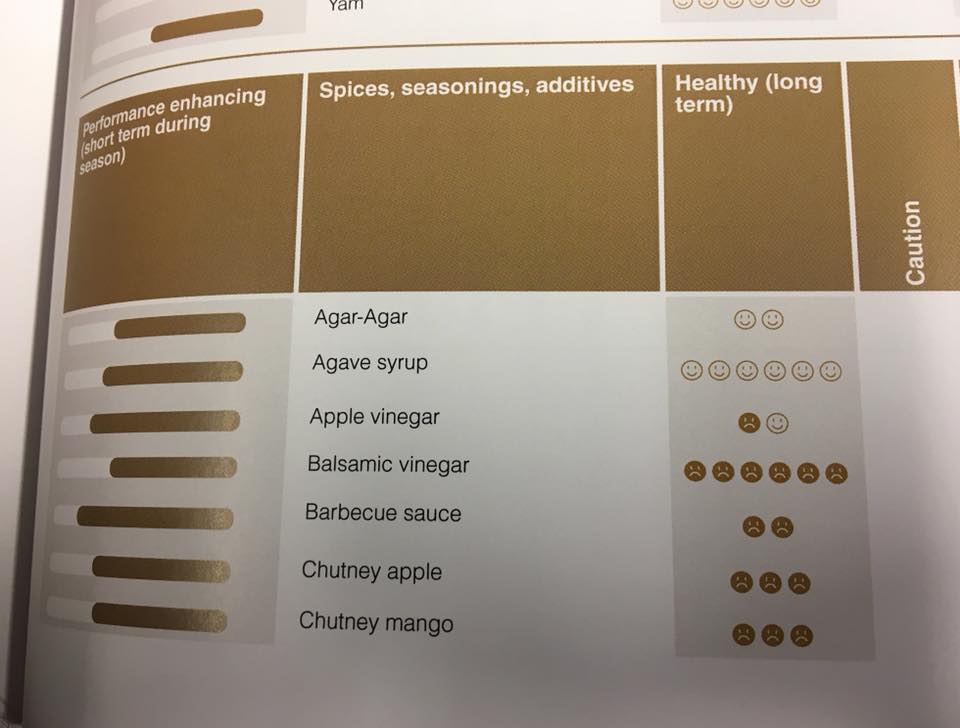
What is DNA genetic testing good for?
When the advice isn’t being oddly specific, it’s broadly generic. It seems it boils down to one, safe, conclusion that we have known for a long time: ‘eat better, make healthy choices and exercise’.
This may be harmless, but is it value for money? Do we need a test, costing up to £1395 for a Health and Nutrition Analysis from Pure Genetic Lifestyle, to tell us that? Dr Dan Reardon, CEO and co-founder of FitnessGenes argues yes. ‘Everyone knows you need to exercise more and eat better, but that doesn’t cut it anymore because if it did, we wouldn’t be in a population that’s almost 70 per cent overweight’.
Knowing that the smallest things they can do is empowering
Let’s say FitnessGenes did accurately determine my genetic makeup; their workout plans tailored for me – these range from four week weight loss to 12 week muscle building depending on the price tag you chose – are extremely useful. The shopping lists, workout plans, recommended local therapists and a diaries to track progress available from these companies are, arguably, part of a toolbox to give you that extra nudge in the right direction.

‘Knowing that the smallest things they can do is empowering’, says Puica of her customers at iamYiam. And she’s not just talking about getting your 5-a-day. ‘Just knowing you are at risk of a certain health conditions, such as diabetes, cardiovascular disease or obesity, is scary. Without knowing what to do next is frightening. Not knowing anything at all is even more frightening in my opinion.
‘If you are predisposed to cardiovascular disease and aren’t even aware that going to the gym every day is life threatening. People may think they are being healthy but you have people falling down in the gym and having a heart attack and dying. London and New York are at the epicentre of that, ’ says Puica, frighteningly. Apparently predisposed to heart disease, and a heavy gym-goer, I can’t say this information does much other than unnerve me. And I’m only 22 years old with a lifetime of prevention space ahead of me – how would a 50 year old react?
Knowing gives you a little more motivation. It makes you act on it.
But knowing such insights has had profound effects on Vanessa Macfarlane’s choices, a scientist and now Business Developer for Pure Genetic Lifestyle.
‘I was a client first and got obsessed by my results. I am at an increased risk of developing breast cancer by 2.7 times compared to the average population. However, the effect of coffee on my risk means I can delay the onset by drinking two cups a day. Excess weight increases the risk by 2.5 times, too. I know if I keep my weight in a normal range, I may be able to not trigger it. It’s the first time I’ve lost weight and kept it off (as opposed to yo-yoing). Knowing gives you a little more motivation. It makes you act on it.’
DNA health testing – the evidence is weak
As inspiring as Macfarlane’s story is, it’s still only an anecdote. ‘Such anecdotes are helpful but they are not science’, says Dr Brody. ‘We have studies that ask people after doing this test do they think they’ll adopt healthier lifestyle and of course they say yes. But we need more research to see what happens two or four years later. I hardly ever see this type of evidence.
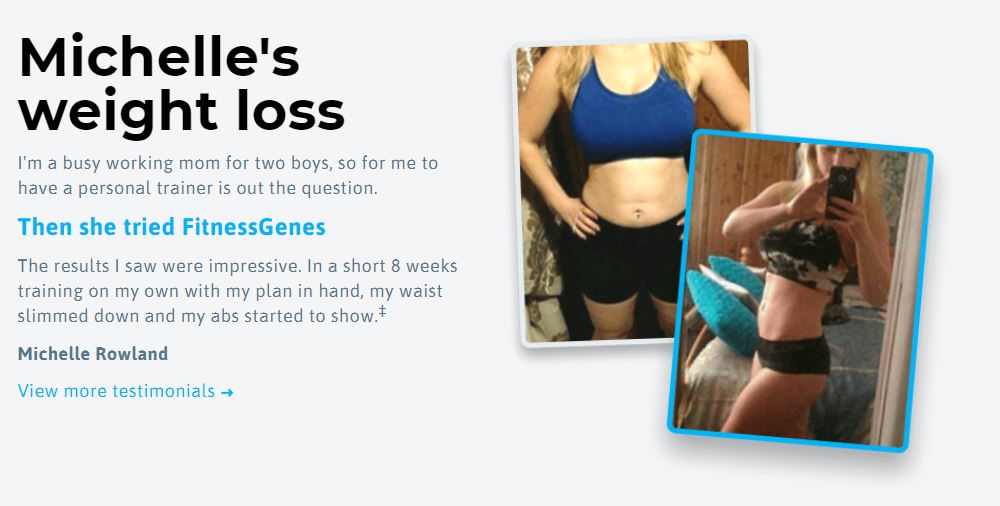
‘It’s ironic, because if these tests had very important consequences, they might be likely to be regulated. The fact they aren’t heavily regulated means they are only working in the lifestyle realm,’ Dr Brody asserts. It’s when companies dip their toes into medical intervention that you need to be careful, he says. ‘There is a grey area between lifestyle and medicine. I would err on the side of caution where a company sells you a genetic test and then urges you to buy supplements that they are also selling.’ I did later find that glucomannan and pectin supplement was recommended to me by iamYiam to support normal blood cholesterol for £25.80 on their website.
You have to look at the credibility of the company and decide whether or not you believe them.
According to FitnessGenes’ website, it is aware that the FDA know of no valid scientific studies showing that genetic tests can be used effectively to recommend nutritional choices.
‘When you’re talking about fitness and nutrition’, says FitnessGenes’ Dr Reardon, ‘anyone can deliver information on how to exercise and eat. You can go on the internet or buy a magazine and there is no regulation on that. You have to look at the credibility of the company and decide whether or not you believe them.’ That credibility, according to Dr Reardon, can be assessed based on the companies partners, research and academic associates.
But no matter how much these companies brag of their affiliated universities, team of scientists and shiny laboratories, I’m more obliged to base their value on the fact there is weak or no scientific proof that these tests work.
Will I be taking the advice of a DNA diet test?
They promise to ‘empower you to achieve peak performance in any area of your life’ (iamYiam), ‘optimize your current and future health’ (Pure Genetic Lifestyle) and help you ‘lead a healthier, longer life’ (FitnessGenes). But after my experiment, the fog is no clearer about what diet and fitness plan I should follow. In fact, I’m even more muddled.
these bold claims are grossly misleading to the normal consumer, playing the ‘science’ card to loosely represent credibility and value for money
Granted, my personal confusion is primarily because I got the results of three different tests. But a normal consumer has no reason to believe a laboratory has got their genetic makeup skewed.
Even if each test’s results are actually accurate, the average person doesn’t know that another test would give them the opposite results, based on which gene variants are being tested for or which ones were left out.
Amongst all the babble, I’m more inclined to go with my gut when it comes to my health, with the best and most sensible advice I have ever heard being to eat foods you love in moderation and do exercise you enjoy as often as you can. Because that’s the only thing you can realistically stick to.
The evidence for its results long term is weak shows how much this field is in its infancy
Knowing your genetics may make navigation between what’s right and wrong for our own bodies easier. It adds another element of motivation. But the fact that the evidence for its results long term is weak shows how much this field is in its infancy. That’s assuming they’ve got your genetics (and what they mean) correctly mapped out in the first place, and the jury is still out on that one.
Obesity levels in the UK are soaring. In 2015, Public Health of England revealed 58 per cent of women and 68 per cent of men were overweight or obese. Because of this, four in ten strokes are now happening in midlife according to a study last week, and younger generations are becoming obese at an earlier age. How incredible, then, would it be for genetic tests to become a public health measure in the future (albeit a very distant one)?
For now however, the industry is in a state I believe that is best described by Alun Williams, a reader in sport and exercise genomics at Manchester Metropolitan University, to Wired Magazine. ‘Tying traits to DNA is like absorbing a book by reading only one word per page—you have information, but at the end you have no idea what the book was actually about’.
READ MORE
Is lactose intolerance a myth?
Could meditation do more HARM than good? These experts think so
10 health myths even smart women believe
Fitness fads exposed – #1 Spot reducing fat
What the DNA testing companies said in reply to our story:
The DNA testing companies we used were each asked why Vanessa’s results were so different. Extracts of their responses are below:
Lorena Puica, CEO and co-founder of iamYiam:
‘Typically most genetic providers look at a few thousand variants, but we have the broadest on the planet looking at 660,000 variants… Our platform is a preventive health platform, it just happens we have the genetics component. We are not a genetic provider. We are a preventative health platform that take your lifestyle data, psychological data and genetic data to figure out what is the most effective protocol for you… We have committed that everything that touches iamYiam is robustly scientifically backed… The reason we have vetted the therapists [recommended on the site] is because there is a lot of quality variation in the wellness space. We have vetted what makes a good CBT [Cognitive Behavioural Therapy] therapist, yoga teacher and more. If you have different preferences that’s perfectly fine.’
Dr Dan Reardon, CEO and co-founder of FitnessGenes:
‘I have no idea why the tests are different. I can only tell you what we as a company are doing. We work with Microsoft, the best universities (Birmingham, Loughborough and Oxford), academics, several PhD scientists from Oxford University with 20 plus years’ experience and companies in the world to deliver the best possible information we can to the consumer to ensure we are contributing to their journey to achieve their goals… You’ll have to look at the credibility of those companies to decide whether you believe them, all I can do is tell you our process. If they are saying ‘we are right’ and ‘we are the best’, well unfortunately that is a superficial statement. You need to establish the guts of that yourself. I’m not telling you that, I’m telling you you are free to look at the website, research, universities and academics we are associated with and draw conclusions yourself.’
Vanessa Macfarlane, Business Development Manager for Pure Genetic Lifestyle:
‘When you look at genes, each one has a specific snip to look at. If you just look at the snip it’s much cheaper, whereas we sequence the whole genome. The accuracy of just the snip analysis is only 60 per cent, but ours is 99.7 per cent. We are probably the most accurate… If we wanted to clone you, we probably could. There are no missed markers or snipping the gene in the wrong place. We are probably the most extensively researched… They say there should be at least three published papers to be able to report any results, as we are doing. Each one we do there is at least ten published papers reporting the same thing. There is a lot of evidence base behind the genes we look at. Thousands of papers, being constantly reviewed.’
iamYiam’s genetic test is available for £387 and includes a Lifestyle Analysis, Genetic Analysis, Goal Setting, Daily Recommendations, Weekly Shopping List, Monthly Reading, Personal Progress Diary and
Success Trophies.
FitnessGenes starting price is £149 for a DNA analysis and four week ‘Get Fit’ plan. This advances to a Complete ‘Get Lean’ 20 week plan for £239.
Pure Genetic Lifestyle’s Sport Analysis is available for £695 and includes a customized nutritional program for sport performance. Other health (and beauty) packages range from £295 – £1395.
Like this article? Sign up to our newsletter to get more articles like this delivered straight to your inbox.



